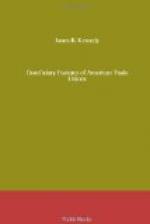Notwithstanding these precautions it has not been possible entirely to prevent the payment of fraudulent claims for sick benefits. The visiting committees of the local unions are frequently neglectful or careless in exercising their supervisory functions, and occasionally knowingly sanction the payment of unwarranted claims. Where the unions do not have an out-of-work benefit, there is always the chance that unemployed members will claim the sick benefit and that the local unions, aware that the money for the payment of the claim comes from the national union, will not scrutinize with any care the severity of the illness.
Reserving to the national officials the right to pass finally upon sick-benefit claims is not effective as a precaution against such frauds. The national officials cannot inform themselves as to the honesty of the physician who signs the certificate nor as to the good faith with which the visiting committee has performed its duties. On the whole, the better policy seems to be to place the responsibility of passing upon individual claims directly upon the local union, and to reserve to the national officials an oversight of the administration of the local unions.
In several of the unions no effective measures appear to have been taken to keep the local unions up to their duties, but in others a close scrutiny is maintained. The system in use by the Iron Molders is probably the most effective of those used by the unions which do not pay a money out-of-work benefit and in which consequently the need for supervision is greatest. Every member of the union is catalogued on a card. When he is reported as having received a benefit payment from any local union, this fact is entered on his card. Members removing from one local union to another and drawing more sick benefits than they are allowed by the rules are thus detected and forced to make restitution. The “financier” of the union also notes the sick rate in each local union. When the amount of sickness in any locality appears to be excessive, he employs for a limited time a reputable physician, who must sign all claims for sick relief. The result usually is the discovery of laxity in the local administration and the necessary corrective measures are applied.[232] The Cigar Makers have a staff of travelling auditors who from time to time inspect the accounts of local unions and scrutinize the administration of the benefits.
[Footnote 232: Proceedings of the Twenty-second Convention, 1902, in Supplement to Iron Molders’ Journal, September, 1902; Proceedings of the Twenty-third Convention, in Supplement to Iron Molders’ Journal, September, 1907.]
The administration of out-of-work relief is similar to that of sick benefits in that the national union must of necessity rely upon the local union. The requirement of registration from day to day is the chief administrative check upon the payment of the benefit to members not entitled thereto.




